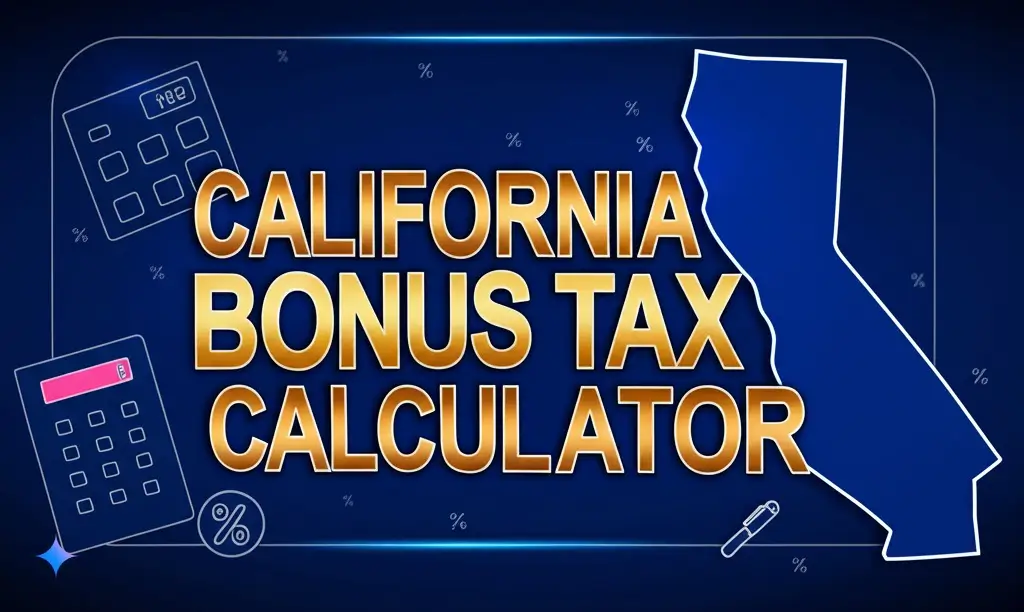How Are Bonuses Taxed in California? A Step-by-Step Guide (2025)
Getting a bonus feels great, but taxes can take a big chunk out of it. If you’re in California and asking, “How are bonuses taxed in 2025?”—you’re in the right place.
This guide answers your question directly: Bonuses face federal taxes (starting at 22%) and California state taxes (10.23%), plus extra deductions like FICA and SDI.
Want to see your exact take-home pay? Calculate your California bonus tax instantly with our free tool.
Let’s dive in!
How Are Bonuses Taxed? (Federal & California Rules)
1. Federal Tax Withholding on Bonuses
The IRS classifies bonuses as “supplemental wages.” They get taxed differently than regular pay.
Flat-Rate Withholding:
- Up to $1 million: 22% federal tax.
- Over $1 million: 37% on the excess.
Withholding Methods:
- Flat-Rate Method: 22% comes out automatically. Simple and consistent.
- Aggregate Method: Combines bonus with regular wages. Taxes depend on your income bracket—possibly higher than 22%. Curious? Learn more about percentage vs. aggregate withholding methods.
FICA Taxes:
- Social Security: 6.2% (up to the 2025 wage cap, likely $168,600—see IRS Tax Topic 751).
- Medicare: 1.45% (no cap).
- Additional Medicare: 0.9% for singles earning over $200,000.
-
- 2025 Update: No big changes yet, but the Tax Cuts and Jobs Act expires in 2026, per Thomson Reuters.
2. California State Tax on Bonuses (2025)
California adds its own taxes to your bonus.
- Flat Tax Rate: 10.23% withheld upfront.
- State Disability Insurance (SDI): 0.9% deduction (check California Franchise Tax Board for updates).
- Progressive System: Regular income tax ranges from 1% to 13.3%. Combining wages and bonuses might increase your rate.
Confused about your take-home amount? Read why your bonus check might seem smaller.
Example: Tax Breakdown for a $10,000 Bonus
Here’s how a $10,000 bonus gets taxed in California:
| Tax Type | Flat-Rate Method | Aggregate Method (Estimate) |
|---|---|---|
| Federal (22%) | $2,200 | $2,500 (higher bracket) |
| California (10.23%) | $1,023 | $1,200 |
| Social Security (6.2%) | $620 | $620 |
| Medicare (1.45%) | $145 | $145 |
| Total Tax | $3,988 | $4,465 |
| Take-Home Bonus | $6,012 | $5,535 |
- Flat-Rate Method: Predictable and lower upfront tax.
- Aggregate Method: Higher withholding, but you might get a refund.
Payment Methods & Tax Impact
How your bonus arrives affects taxes.
Lump Sum Payment:
- Uses flat-rate method (22% federal).
- Easy to calculate—see Bankrate’s bonus tax guide.
Bonus Combined with Regular Wages:
- Uses aggregate method.
- Could push you into a higher bracket temporarily.
Strategies to Reduce Bonus Taxes
Keep more of your bonus with these tips.
- Contribute to a 401(k) or HSA: Lowers taxable income.
- Adjust Your W-4 Form: Fine-tune withholdings
- Defer Your Bonus: Shift it to 2026 if your income drops.
- Negotiate Non-Cash Bonuses: Stock options might mean lower taxes later.
Future Tax Law Changes (2025 & Beyond)
Tax rules might shift soon.
- TCJA Expiration: Ends 2025—rates could rise in 2026.
- SALT Deduction: $10,000 cap might lift, benefiting Californians.
- Stay Updated: Track changes via Thomson Reuters.
FAQs: Common Questions on Bonus Taxation
Yes, bonuses are supplemental income taxed at a flat 22% federally and 10.23% in California. This differs from regular wages, which follow progressive tax rates.
California treats bonuses as supplemental income with a fixed 10.23% state tax rate. It’s separate from your regular income tax bracket.
The IRS taxes bonuses at a flat 22% for amounts up to $1 million. Above that, it jumps to 37%.
Yes, the State Disability Insurance (SDI) tax of 0.9% applies to bonuses. It funds disability and family leave programs.
Yes, if federal or California taxes are over-withheld, you’ll get a refund when you file your taxes. It adjusts to your actual tax liability.
Yes, stock bonuses may face capital gains tax instead of income tax, depending on when you sell. California’s rate can hit 13.3% for high earners.
No way to avoid taxes completely, but contributing to a 401(k) or deferring the bonus reduces taxable income. Plan ahead to save.
Your bonus is added to your regular wages, then taxed at your normal income tax rate. Employers might use this instead of the flat rate.
You’ll owe the difference when you file your California and federal taxes. Check your paystub to avoid surprises.
Possibly—federal rates could rise if the Tax Cuts and Jobs Act expires. California’s rates might shift with state budget changes.
Multiply your bonus by 22% (federal) and 10.23% (state), plus 0.9% SDI. Or use an online calculator for quick results.
Yes, both are supplemental income taxed at 10.23% in California and 22% federally. Non-cash value is based on fair market price.
Not for withholding—California uses a flat 10.23% regardless of income. But your total income impacts your final tax bill.
Yes, SDI stops once your total wages hit the 2025 cap (around $168,000, subject to annual adjustment). No more deductions after that.
Not usually—bonuses are taxed as income, not business earnings. Talk to a tax pro for rare exceptions.
Conclusion
In 2025, California bonuses face a 22% federal tax and 10.23% state tax, plus FICA and SDI. Lump-sum or combined payment methods change your withholding. Tax planning—like 401(k) contributions—cuts the burden.
